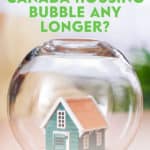Can Anyone Really Deny The Canada Housing Bubble Any Longer?

Ok, I know I am not exactly breaking any news here, but if there are still people out there that believe Canada’s metropolitan centres are not in the middle of a large housing bubble, then I wish to tell them I have joined the ranks believers. I should first qualify my statement a little. I think it is a misnomer to say that “Canada is experiencing a housing bubble.” Instead, it is more accurate to say that our biggest centres (namely Vancouver and Toronto) are experiencing a severe real estate bubble.
Homes in other areas are probably fine. For example, I live in the prairies, and with all the natural resource extraction going on, combined with some of the most profitable circumstances for farmers in decades, I assume home prices will continue to rise at a healthy rate. If you live in the Martimes, chances are that you have never seen a real estate boom in your life (or you’re old enough to remember Confederation), and with the offshore drilling going on for next couple decades, you should be fine as well. Us country mice might feel a few aftershocks if the house of cards (which could be an accurate metaphor for the lack of construction value seen in many new houses today) comes tumbling down, but our urban brethren will undoubtedly be harder hit.
If I Had a Million Dollars I’d Buy… an Old Bungalow?
So what event pushed me to cross over to the side of real estate bears? Globe and Mail recently had a story about a not-so-special bungalow in Toronto. This run-of-the-mill house was built in the 1960s, and includes 3 bedrooms. From the details of the story, and the picture provided, there doesn’t seem to be any extenuating circumstances. Actually, it looks a lot like the house I currently own, but with less of a yard, and a smaller garage. So when I saw an asking price of $759,000 I thought it was pretty high, but then I realized what the headline of the article pertained to. You see, this house managed to sell for over $1.18 million dollars! This “everyman’s house” that had the good fortune to be built in a decent neighbourhood sold for $421,800 over the asking price!
This simply tells me that something is off. When a house sells for over a million dollars, it should belong to a rich person. Yet this is not a rich person’s house. The story went on to say that the buyer was a foreign student. Maybe this elite immigrant phenomenon is what is driving up prices in Toronto and Vancouver, and maybe it isn’t quite on the level that USA speculation was before their crash, but there is definitely still a major real estate bubble that is read to burst in these cities.
We’ve Learned From The American Model… Right?
Now the Canadian government will tell you that this is impossible to have a Canadian housing bubble since it is harder to obtain a mortgage here. We have stricter lending rules, and there are no such animals as balloon mortgages or “teaser rate” mortgages around here (if you’re not sure what these terms mean, count yourself among the lucky). While this maybe technically true, one could make the argument that the entire housing market is selling at a teaser rate right now. The big bank oligopoly of Canada made news again this week by slashing mortgage rates back to all-time lows of 2.99% over four years. This encourages people who are trying to buy “all the house they can afford” to make irresponsible decisions, and creates an upward spiral of speculation fueled by cheap money.
Stress Testing The “Average” Mortgage
For a basic idea of just how quickly many couples’ financial situations will change in a few years, let’s take a look at an “average” mortgage these days. For a household looking to buy a “fixer-upper” for a measly $500K (excuse me while I go vomit) and making the usual bi-weekly mortgage payment, we are looking at manageable payment of $1,090 (assuming our 2.99% rate). If this rate goes up to something resembling the Canadian historical average of say 5.99%, the payment goes up to $1,475. If all of this printing money fuels inflation, and the Bank of Canada decides to jack rates up in order to battle it, you can see how these payments can climb quickly. This would all be ok as long as people planned for all of the costs associated with owning a home. I mean, everyone knows about the maintenance costs, the taxes, the utilities etc., right? Not according to everything I’ve read.
That’s ok though, we all have money saved for a rainy day… oh, actually we collectively owe over 150% of our yearly salary, oooook. People have to factor in however that we all have superb job stability… *gulp* right? Canadians are stretched incredibly thin, and yet we refuse to respond to policy makers’ warnings because while they warn out of one side of their mouth, they keep lending out cheap money on the other side. Economists will tell you we will always respond better to the financial incentive than a moral warning.
No Worries… blah blah… Soft Landing
The verbiage we keep hearing out of real estate professionals (why do news stories always feature these guys as the “unbiased” experts anyway) is that there will be a “soft landing” is the housing market. Maybe there will be. Maybe the demand is so high in certain areas, and the demographic trends are so unprecedented that there will be a gradual levelling out in the housing market. The only evidence to the contrary is all of history after all. Ever notice how the “experts” in every bubble will deny that there is a bubble until they are blue in face, and then switch midstream to this whole “soft landing” thing, and then finally they say that it was impossible to foresee the fact that a bubble was forming due to the surrounding circumstances?
As Canadians salivate over record low interest rates, and test our general lack of financial literacy, does anyone really want to bet that we are making sound and sustainable decisions right now? While we might not see quite the geographical breadth, nor the financial depth of the crash our big brothers to the South of us experienced, I think there is little doubt that major debt correction has to occur in Canada sooner as opposed to later.
Once housing prices begin to fall, the trend may very well be combined with higher interest rates. This combination of disincentives will likely destabilize the whole market. Anyone else feel like we are in the 35th round of a Jenga game and we’re trying to get that last block loose?


Comments
They say that if you can measure it, you can control it. The government measures inflation by CPI. But that excludes asset-price inflation. Hence unnaturally low interest rates have led to inflation that the government doesn’t count as inflation.
Yah, well the other thing is that the government needs to keep the interest rates low to offset those of the USA. Manufacturing is already dying in this country, the political pressures obviously play a role.
I guess we’re in a bubble, but I’ve never really seen prices lower in Vancouver. I mean, they’re not low right now by any means, but I guess I just am looking at it as if prices are staying the same. I’d never buy in Vancouver – only the towns/cities surrounding (I couldn’t fathom spending that much money on a mediocre house), so I wonder if it will ever burst and prices will ever go down with foreign investors.
I think you’re just looking in the wrong places Daisy. Check out this globe and mail article: http://www.theglobeandmail.com/report-on-business/economy/housing/vancouver-housing-pulls-prices-higher/article2061554/
2011 prices were up over 25% from 2010!
Good to see others recognizing the problem. It was starting to get lonely out in bear country.
The Maritimes HAVE in fact experienced a housing boom recently, at least in certain areas. Nova Scotia had one of the biggest jumps in home prices year-to-year, and construction there is booming – and actually selling, unlike in Vancouver and Toronto. The Maritimes won’t be nearly as hard hit as those much bigger cities, but they certainly have a few things to keep their eyes on there as well.
Simply to back up what I’m saying http://thechronicleherald.ca/homesnews/69093-house-prices-inventory-rise
I hear you Kate. My general impression is that prices were extremely low in the Maritimes for a long time. The recent surge in prices has been fuelled by increased incomes due to the natural resource explosion. This seems sustainable to me for at least the medium-term (until the natural resources run out anyway) as opposed to some of the speculation and low-mortgage mania that is going in TO and Vancouver.
If you think the bubble is about to burst and you want to sell your house, then contact me because I’m always buying houses. Personally, I don’t expect any bursting. People want to live in Vancouver and Toronto so there will be great demand as long as they remain great cities. But if the “powers that be” rapidly increase interest rates, then there will definitely be downward pressure on house prices. It’s educational to look at a graph of house prices in the late 80s and early 90s. House prices rose rapidly in the late 80s and there were geographies where house prices doubled in 3 years. Then prices declined in the early 90s. Now in the 2000s house prices doubled over 10 years, so any decline shouldn’t be as bad as the 80s/90s scenario.
So intense downward pressure is different than “a bubble” how exactly? You don’t think things should be as bad as the 80s and 90s? What about all the metrics that look identical to the USA housing crash of a few years ago? Trust me, if I had houses to sell, I’d definitely sell ’em. You really think there is no speculation going on in a place like Toronto where incomes are set to take a nosedive yet housing prices keep doubling every 3-4 years?
Kyle, while I agree with you to a certain extent, I have to say, that I do not believe this bubble is really regional. I live in the prairies as well, in fact in one of the cities that has grown more rapidly in recent years then any other, Regina. Now, it blows my mind that Regina housing prices have climbed so rapidly BECAUSE Regina is a government city, NOT a resource based economy. Saskatchewan, now that’s a different story. HOWEVER, the larger part of our workforce in saskatchewan is still services based. Regardless, at this time with the world in the trench of uncertainty we have to remember one thing about resources…they are only economically viable when indexes are up…all of them have a line in the sand. When the world can no longer afford resources, what happens? of course prices drop, and when prices drop, economical feasibility diminishes, as do profit margins. The thing about a resource economy in such uncertain times is almost literally overnight, they CAN BE CRUSHED. SK is HEAVILY reliant on the world markets when it comes to our “boom”. Do not let that stray from mind. I’ll tell you to, the general feeling I get these days, all of these immigrants pouring in to the City, for what jobs, I am no certain…but it all seems so artificial to me, it just doesn’t feel right at all.
Vancouver becomes a lot more desirable if Toronto starts getting months of 40 degree heat and $300.00 a month air conditioning bills in the Summer. Vancouver prices are adjusting for sure but many thousands are looking to buy so we’ll see when they feel it’s time to get in.